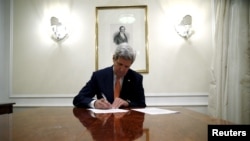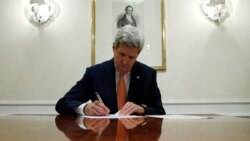In recent testimony before Congress, Stephen Mull, the State Department’s Lead Coordinator for Iran Nuclear Implementation, said that all the participants of the Joint Comprehensive Plan of Action have so far fully implemented their commitments under the terms of the deal:
“It’s important that we recognize what an accomplishment that is towards advancing, not only our national security, but that of our closest friends and allies, particularly those in Middle East.”
The JCPOA, as it is known, was reached in July 2015 by Iran, the European Union and the P5+1 countries. In exchange for the lifting of nuclear-related sanctions, Iran agreed to take a series of verifiable steps to ensure that its nuclear program will be exclusively peaceful.
Mr. Mull said that Iran has completed dozens of specific actions to limit, freeze or roll back its nuclear program and subject it to full transparency by the International Atomic Energy Agency. In exchange, the nuclear related sanctions imposed on Iran have been lifted.
In order to clarify what business is now permitted with Iran, the United States, at the request of foreign governments and partners, has been engaging in outreach to the public and private sectors.
“As long as Iran continues to meet its nuclear commitments, we’ll continue to meet our commitments on sanctions,” said Mr. Mull.
But to enjoy the full economic benefit from the lifting of the nuclear sanctions, Iran must make sure it financial house is in order. Acting Treasury Undersecretary for Terrorism and Financial Intelligence Adam Szubin noted that some companies and banks around the world continue to have concerns about doing business in Iran.
"Some are concerned about their financial transparency. … Others are noting concerns about corruption as well as regulatory and other obstacles to conducting business in Iran; and still others cite Iran’s provocative behavior outside the nuclear file, including its active support for terrorism and its ballistic missile testing.”
“As Iran pursues more business, it is incumbent on Iran to address such problems, to undertake meaningful reforms and create an environment in which businesses feel secure,” said Undersecretary Szubin.
Mr. Szubin called the JCPOA “a tremendous breakthrough,” that represents a peaceful solution to what had been one of the world’s most serious security threats. It is incumbent on all parties to ensure it works as intended and stands the test of time.






